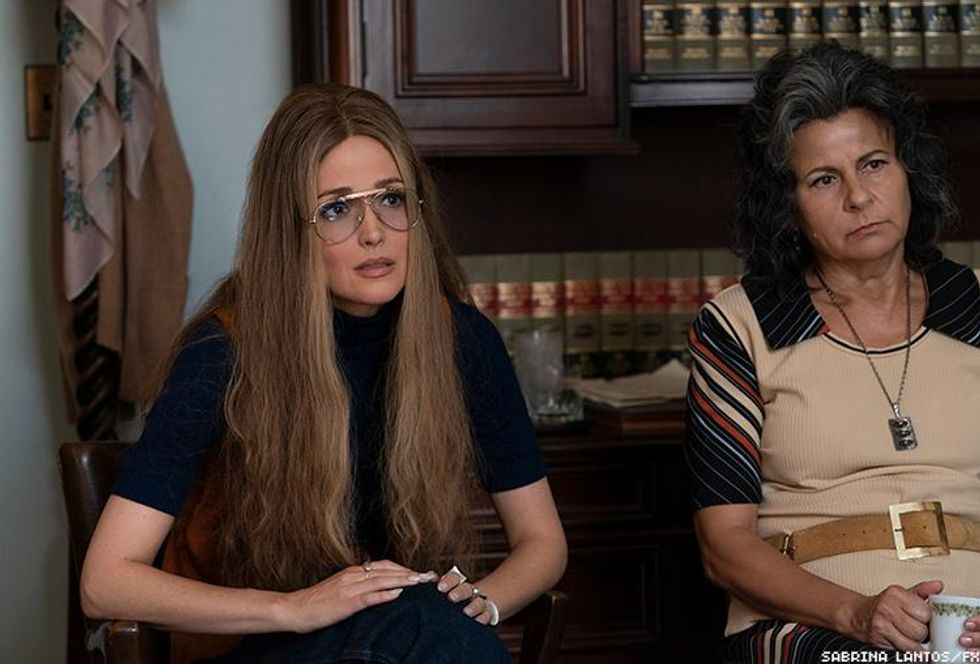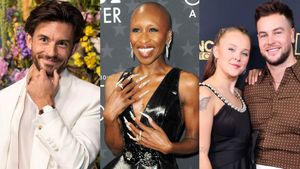Battle lines for the still yet-to-be-ratified Equal Rights Amendment are drawn early on in the first episode of the limited series Mrs. America. The FX on Hulu series juxtaposes conservative housewives led by Phyllis Schlafly crusading against the ERA (who deploy many of the same arguments the religious right now uses to deny trans and queer people their rights) with feminists of various stripes fighting for the constitutional amendment. Gloria Steinem, Bella Abzug, and Betty Friedan are among the feminists featured in that fight.
Just this year, nearly 50 years after the story of Mrs. America begins, Virginia tipped the scales of the proportion of states needed to put the amendment into effect, becoming the 38th to ratify it.
"Equality of rights under the law shall not be denied or abridged by the United States or by any state on account of sex" is the seemingly simple message of the amendment that became a hot potato that's still used as a cudgel to deny women rights.
Where the ERA goes from here after Virginia's ratifying of it is another story. But the discourse and power struggles among the conservative housewives led by Cate Blanchett's diabolically perspicacious Schlafly driving her flock with incendiary terms like "rigged elections" and "unisex bathrooms" are eerily familiar to conservative arguments amplified since the 2016 election.
What's more, Mrs. America highlights the disparity between the various groups of feminists fighting for equal and reproductive rights but unable to agree on who gets to be the bearer of those messages, as if the issues of straight white cisgender women are on par with those of women of color and lesbians or queer women. Today, some of the white and straight women fighting for the ERA would be considered white feminists who failed at intersectionality.
In one episode, Margo Martindale's political fireball Bella Abzug spars with Uzo Aduba's Shirley Chisholm -- the pioneering Black politician who became the first woman of color to run for the presidency. Mrs. America has Abzug go all in ordering Chisolm to drop out of the race for the so-called betterment of all and to allow a white man, George McGovern, to more easily land the Democratic nomination under the pretense that he intends to fight for the rights of women.
Meanwhile, Friedan (Tracey Ullman), cofounder of the National Organization for Women and author of the benchmark feminist text The Feminine Mystique, famously refers to lesbians and queer women as "the lavender menace," dismissing their cries for equality as a stumbling block to women's rights at large. Another episode sees Niecy Nash's Florynce "Flo" Kennedy roundly call out another Black feminist for arguing that lesbian rights are not in the same wheelhouse as the needs of other women of color.
Amid all of it is the towering cultural figure and cofounder of Ms. Magazine Gloria Steinem navigating other people's quest for power like land mines with her quiet, thoughtful ferocity brimming behind her aviator glasses. Heads turn when she enters rooms and voices "shh" to hear her when she makes her intentions known. In the series, she's embodied by Rose Byrne, who's equally erudite in drama and comedy from Damages to Bridesmaids to Spy. Her Gloria, often in trousers, a bohemian blouse, those notorious sunglasses, and a killer wig indicative of the era, is at the center of the maelstrom around women's equality.
"[Her] power was so different [from women like] Bella Abzug and the Betty Friedan," Byrne tells The Advocate. "She was not loud. She commanded a room in a very different way."
Within moments of her appearance in the pilot, as evidenced by favorable reactions on social media, it was as if Byrne had cemented the definitive interpretation of Steinem. It's her Steinem's seemingly breezy refusal (at least in the series) to directly engage with Schlafly that is a thorn in the side of the media-driven woman who once famously influenced some of Illinois's male politicians with homemade bread and jam. Byrne's Steinem is as appealing and elusive to Schlafly (who desires to debate her) as she is to the men who objectify her.
The series homes in on Steinem's appearance and how others deploy it as reductive while Schlafly's appearance as a "Barbie Doll" is also used against her (Blanchett's Schlafly appears to, at turns, relish and revile being boiled down to her looks).
"She was more like a cat or something -- very subtle and calm and truly unflappable," Byrne says of Steinem's power. "Tremendous too -- the sort of strength that she had; this inner strength combined with her insane compassion. That's a very interesting combination."

Rose Byrne as Gloria Steinem and Tracey Ullman as Betty Friedan
She notes that Steinem was a punching bag for those on the right at the same time she was roundly objectified for her looks.
"It was amazing, the footage I would see of her being interviewed by men in the '60s and just how insulting and objectifying and the blatant sexism. It was extraordinary, the stuff she had to deal with and put up with," Byrne says. "She was just unflappable, the choice to take it in her stride. She never folded, she never looked, it was so subtle when she would be irritated, or she would just deflect it or use humor or wit or whatever."
"To see what she had to endure was really eye-opening," Byrne says. "She was absolutely defined by how she looked, and trying to explore that in the show I think was really important."
As for rising to the challenge of playing the living icon in the series from creator Dahvi Weller, Byrne says, "It was very daunting, are you kidding me?"
"I was immediately like, 'I'm not doing this. Are you crazy? It's Gloria Steinem. Excuse me,'" Byrne says. "And then I was like, 'Oh, I guess I have to do it because it's so nerve-racking and scary.'"
"I just dove in. Once I was in, I just started, but initially, I was very nervous."
"My main question for [Weller] was, obviously [about] portraying this sort of historic retelling of this historic moment in time," Byrne says.
Regarding taking on a figure who's been in the public eye for 50-plus years, Byrne says, "I was interested in trying to discover her and what is the cost of that? What is the cost of that on someone's life?"
"We see just one image from one side and the narrative of the media and the press, but what happens once you take off the glasses and take off their shoes? Well, 'Who's that person?'" she adds.
But Weller was there with the goods. She sent over a massive research packet that Byrne says she dove right into. At the core of the research is Steinem's 2015 autobiography My Life on the Road, which chronicles her parents' separation and her childhood that led to her public life of activism and traveling the world listening to people's narratives.
Through its serial storytelling of various women on both sides of the women's movement, with episodes dedicated to Chisholm and the Republican (back when bipartisanship existed) activist for the ERA Jill Ruckelshaus (Elizabeth Banks), Mrs. America teases as to whether or not Steinem and Schlafly will ever engage in the face-off that Schlafly so desires. For viewers, it's like awaiting a match between titans in a prizefight that may never come to pass. For Schlafly, Steinem's rebuff continually stings.

Schlafly's rhetoric of the day is uncannily recognizable post-Donald Trump. She terrorizes housewives by saying they'll see an influx of homosexual marriage, unisex bathrooms, and free-for-all abortions. At one point, she tosses out the now-hackneyed term "rigged" when speaking of a run for the Illinois state legislature that she lost. While Mrs. America doesn't utilize the term "intersectionality," it's certainly baked into the skirmishes among women on the left. The series honors Steinem for her activism, but it also points out blind spots.
During a Ms. Magazine editorial meeting, Steinem fails to really listen to one of her editors, Margaret Sloan (Bria Henderson), a Black lesbian who pitches a story that gets to the heart of how the issues affecting white women are not the same for women of color. In the scene, Steinem essentially ignores the pitch, floating over it to something they've done before.
"[It was] important to show the flaws at that time," Byrne says of the lack of intersectionality that was happening. "It just goes over their head, and it's not part of the complexity of the conversation. But it's there, and there was a divide and there was this tension between the Black feminists and the white feminists and the lesbians, and [the show is] trying to show that tension."
"It was real and existed, and it still exists," she adds. "There's intersectionality, there's a word for it now, and there is dialogue around it, whereas back then it wasn't as clear."
While Mrs. America depicts through the women on the left the nascent discussions (or lack of discourse) around standing up for issues affecting marginalized women, through Schlafly, it illustrates the rise of the stealth conservative blond bombshell that fed into Reaganism, the rise of the right, and Fox News.
"You've got lots of conservative personalities running media like Roger Ailes and [Sean] Hannity. This is the root of this movement. And the rise of those sorts of movements," Byrne says.
As for Steinem's enduring power, Byrne hearkens to recent events.
"Also, #MeToo," she says. "#MeToo wouldn't have existed without second-wave feminism, without Gloria Steinem, without Betty Friedan, without all these competing voices in second-wave feminism."







































































Charlie Kirk DID say stoning gay people was the 'perfect law' — and these other heinous quotes